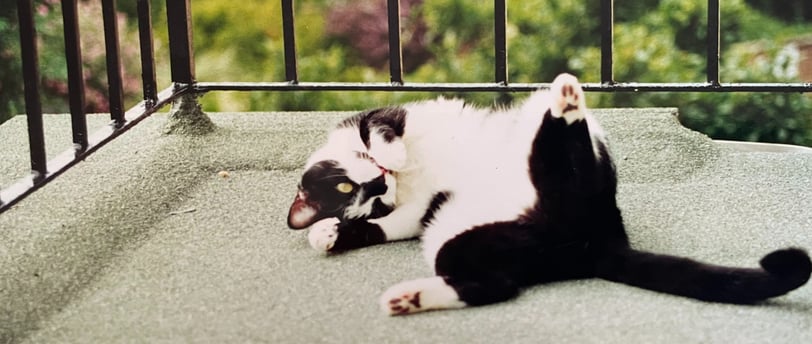Chapter 14 Rehabilitation


On a road to recovery
When I first moved in with Lisa, I was 26 years old, measured 5ft 6" and weighed a little under eight stone. My body was broken and my mind was completely screwed. My paranoia was very real and the visual and auditory hallucinations were more intense and seemingly more real than they had ever been. The sporadic panic attacks were continuing to be overpowering, frightening and sometimes tearful. What had started out as mild depression, had turned into, what is currently referred to as ‘psychotic depression’.
With less than £20 left in my overdraft, I quit my job, found a new tenant to take my place in the shared house and moved in with Lisa and her cat Jack. My only possessions comprised of clothes, a stereo system, my CD’s and some books. After I had physically moved all my stuff, I sold my car due to me no longer working and not being able to keep it running. It was back to basics and I felt that I had lost everything.
The week before my brief spell in the mental ward, I was in the worst place mentally that I have ever been in my entire life. Reaching the point of wanting to end your own life has to be the ultimate low for anyone. I had had suicidal thoughts before during that same year but the morning before the hospital, was the first time I had let go and accepted it as the only logical solution to ending the relentless pain and distress that I was experiencing. The one and only good thing that had come out of that hospital visit was my own open acceptance that I was truly ill and this wasn’t just how life was. This wasn’t ‘me’, this wasn’t ‘it’. I was ill and if I was ill, it meant that there was at least a possibility of me getting better. When Lisa offered me the spare room in her flat, rent free, I gratefully took it as the lifeline that it was, an opportunity to focus solely on getting myself well again.
Some people are able to live with diagnosed depression without the need for antidepressants. The ecstatic highs can sometimes be worth taking in exchange for two or three weeks of bed rest, with the transition between the two states being gradual rather than jolting. Mine however, was not a type that would gently sway and settle out on its own after a few months. I had learnt the hard way that left untreated or unacknowledged, my mental state would steadily spiral downwards and become worse still until eventually, suicide would be an inevitable conclusion.
During the previous five or so years of living with depression, each time I asked a doctor or a counsellor if it could be due to a chemical imbalance, the answer had always been a resounding ‘No’ coupled with a weak explanation of “It usually stems from something which happens in your childhood”. But my childhood was pretty good. There was no neglect or abuse, just the regular ramblings of an 80’s childhood. Fast forward to today’s more advanced understanding of mental illness, it is now very clearly understood and accepted that a mental illness such as depression can sometimes be purely down to a chemical imbalance. There are usually some external triggers for chemical depression but the potential for it to rise to the surface will always have been there and a downturn that is left undiagnosed or untreated, can continue to spiral further downwards until the body finds it hard or even impossible to correct itself. A bit like catching a virus, if ignored the symptoms will only get worse until the virus eventually takes over the body’s most basic of functions.
Having exhausted all avenues trying to find answers and reasons for how I was feeling from the external world, I concluded that the core of this illness, at least in my instance, was due to a lack of or misplaced chemicals inside my own body. I decided that I was never going to be able to live a regular life until I faced and dealt with this like I would any other physical illness. Instead of focusing on the psychological aspects of my mental health, I began to focus only on the physical, mainly eating and sleeping patterns to begin with.